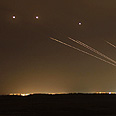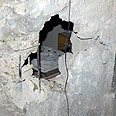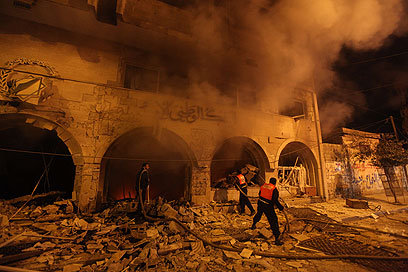


According to the senior state official involved in the details, the government's top nine ministers decided that Israel would strive for a ceasefire rather than continue the operation.
Related stories:
- Reserve officer wounded in Eshkol
US prevents UN statement excluding rockets
Ban warns of escalation; Clinton to arrive in Israel
The IDF spokesperson told Ynet on Tuesday that "if we reach a situation in which the south's security is undermined again, we will act again."
Environment Protection Minister Gilad Erdan said in an interview at the Ynet studio, "We have forgotten that once soldiers were supposed to risk their lives in order to protect civilians, and not – God forbid – to put civilians at risk. Is a ground offensive the first option? No. If peace can be guaranteed for the long term without a ground offensive, so be it.
"A ceasefire is not for the sake of a ceasefire. The south and other parts of the country want to see the threat removed," Erdan said. "The best way to achieve it is for us to support it. If this happens with an agreement that has holes in it again and we won't know what happens when the rocket fire stops, when missiles drizzle from the Strip – that is exactly what the prime minister is looking into with the international community, Egypt, (US Secretary of State) Hillary Clinton."
According to Erdan, "The prime minister must insist on bringing Clinton and (UN Secretary-General) Ban Ki-moon to those places where rockets are falling, because President Obama, since his visit to Sderot, understood the feeling of being attacked by missiles and having to take shelter."
As for the talks being held with Egypt, Erdan expressed his hope that "unlike the Mubarak regime, the Muslim Brotherhood – with all their disadvantages – have the advantage of deterrence. We saw their response to what happened in Sinai."

Rocket fire, IDF strikes and high alert. Seventh day of Operation Pillar of Defense (Photo: Herzl Yosef)



IDF Spokesperson Brigadier-General Yoav Mordechai explained that "this is not a reality of once and for all. There was no specific operation that restored calm completely."
He expressed his hope that "this round, which led to a focused, accurate, surgical hit will create some sort of deterrence. The IDF has met its objectives. The strategic goal is to improve the security-related situation in the south and hit Hamas. There are very good achievements in hitting Hamas. As for an improvement in the security situation – that will be tested over time."
Brigadier-General (Res.) Ran Peker added during the live broadcast that "at this stage, they have used incredible wisdom. Gaza is the most crowded place. Had they entered immediately with ground forces, we would have suffered losses."
Asaf Shariv, Israel's former consul general in New York, commented on Hamas' status following the operation. "One thing is clear – we have put Hamas back in the center of activity. Foreign ministers from all over the world are coming to talk to Hamas.
"It has become a normal thing. As far as Hamas is concerned, this is a huge achievement. As far as Israel is concerned, I don't think there was a significant thing here. Perhaps only one thing – recruiting the Egyptian president."
- Follow Ynetnews on Facebook and Twitter
- Receive Ynetnews updates
directly to your desktop















